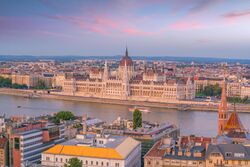Fornænda
This article is incomplete because it is pending further input from participants, or it is a work-in-progress by one author. Please comment on this article's talk page to share your input, comments and questions. Note: To contribute to this article, you may need to seek help from the author(s) of this page. |
Fornænda | |
|---|---|
Capital City | |
 | |
| Country | |
| Astozarno | Chenterno Pontanoresca |
| Founded | 1266 |
| Government | |
| • Type | Mayor-Council |
| • Body | City Council of Fornænda |
| • Mayor | Lenas Yurian (Socialist) |
| Population (2020) | |
| • Urban | X |
| • Metro | X |
| Demonym | Fornændan |
| Website | fornænda |
Fornænda is the capital of the Caropsyne Pontanore, the principal city of the Pontanore State of Carops, and both the urban city and the surrounding metropolitan area make up of the entirety of the Pontanore Capital Administrative District (Standard Caropsyne: Chenterno Pontanoresca). It is the second-largest city in all of the Pontanore with a combined population of X million, comprising of X of the entire state's population.
The city, located along the Vacora River, was established at the same time as the formation of the Kingdom of Carops in 1266 under the reign of the first monarch, Othæglin. The construction of Fornænda would become the single largest construction exercise in all of Caropsyne history, taking over 150 years to complete. Although the original city is no longer standing for the most part, some structures from the days of the Old Kingdom have managed to survive the centuries including the Cansarte Palace and the Arch of Nepios. Central Fornænda's architecture is a mixture of baroque and art nouveau styles while outer districts are dominated by modern and soft-socialist in line with the nation's social democratic philosophy.
Fornænda is the undisputed cultural center for the vast Caropsyne diaspora. It is the center of national government, commerce, finance, transportation, entertainment, and education. The city is host to the headquarters of both the Council of Nations, and the Thearean Community. Fornænda is well-known for its exceptional resturants and cafes, cobblestone squares and marble fountains, and beautiful parks.